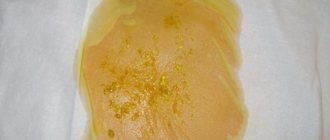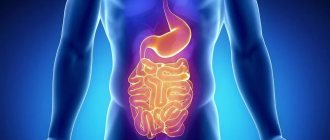Author of the article: Tironova Inna Igorevna
Gastroenterologist, therapist
15 years of experience
Professional skills: Colon hydrotherapy, treatment of gastrointestinal diseases
Intestinal upset is an unpleasant problem that can be caused by stress and unusual foods, as well as serious diseases of the digestive tract. The latter is evidenced by the combination of diarrhea with other symptoms. Belching and diarrhea with a specific smell of hydrogen sulfide is a direct indication of a violation of secretory function.
Specifics of this phenomenon
The combination of diarrhea and belching indicates dysfunction of the small intestine. It is here that protein compounds are digested, while in the stomach the food bolus is just formed and carbohydrates are processed. The intestines produce specific enzymes that allow the breakdown of food proteins into smaller fragments.
The smell of hydrogen sulfide accompanies the process of rotting proteins. Most of these compounds contain sulfur. When digested at a normal rate, the protein is mostly absorbed in the small intestine, and undigested residues move to the large intestine and are evacuated.
If at any stage the protein digestion mechanism is disrupted, the following appear:
- Unpleasant smell . The starting point is a disorder of the intestines, not the stomach. With low enzyme production, poor motor skills, and insufficient bile acids, proteins are partially not digested, are not excreted on time, and are turned into food for putrefactive bacteria.
- Bloating . The formation of gas causes flatulence and bloating. It is partially excreted through the intestines. With a simple disorder, for example, overeating, this is the extent of the matter.
- Diarrhea . Undigested food remains become a source of toxins. The body tries to get rid of them: diarrhea appears, usually profuse and watery, with a frequency of at least 5 times a day.
- Belching. If hydrogen sulfide cannot be eliminated through the intestines, it goes back into the stomach and exits through the mouth. Which is what burps smell like rotten eggs.
Another option is also possible. In addition to proteins, there are a number of foods (watermelon, garlic, beans) that can provoke belching with a corresponding smell. When incompletely digested, they cause fermentation, accompanied by the release of hydrogen sulfide. This phenomenon is usually associated with low gastric secretion.
Preventive actions
It is not difficult to avoid indigestion, diarrhea, and belching; you just need to follow simple recommendations:
- for any disturbances in the gastrointestinal tract, seek help from a doctor;
- avoid overeating;
- stop consuming high-calorie foods and drinks that promote the formation of gases (kvass, carbonated water, beer, sparkling wine);
- get rid of the habit of talking while eating;
- chew food thoroughly;
- include only high-quality and fresh foods in the diet;
- wash fruits and vegetables thoroughly;
- eat 4-5 times a day, but in small portions;
- eat soups every day;
- give preference to steamed dishes;
- give up fast food and snacks on the go;
- get up from the table when there is still a slight feeling of hunger;
- get rid of bad habits.
( 1 rating, average 4 out of 5 )
Source
Possible reasons
Belching with the smell of hydrogen sulfide and acute diarrhea are caused by two main mechanisms:
- With insufficient contractile function, the stomach is unable to form a bolus of food and ensure the timely movement of food into the intestines. As a result, fermentation processes begin in the stomach, which causes belching. Too weak intestinal motility leads to the same result. Undigested protein residues remain in the intestines for too long, which leads to rotting. Diarrhea that appears is accompanied by belching, and nausea and vomiting are often observed.
- The second mechanism is associated with a small amount of digestive enzymes. Their absence may be due to congenital abnormalities (lactase deficiency, gluten intolerance) or acquired (dysbacteriosis after a course of treatment).
Important! Overeating is the most common cause of diarrhea and belching. A full stomach cannot cope with its functions. Poorly processed food begins to ferment, then ends up in the intestines, where it cannot be properly absorbed and, ultimately, rots.
If diarrhea and belching with the smell of hydrogen sulfide persist for more than 2-3 days, you should consult a doctor.
Prevention of deviation
Despite the fact that the phenomenon of belching with an unpleasant odor is common, it can be avoided by following the rules of diet and diet. First of all, you should actively engage in sports; if this is not possible, then walking in the fresh air every day is enough. You need to give up bad habits, such as frequent drinking of alcoholic beverages, smoking, overeating, snacking on the run, eating dry food, as well as eating and drinking down all stress with alcohol. This will not only significantly affect the condition of the digestive system, but also generally worsens human health. Nutrition is the main condition for maintaining the health of the human body, since digestion and the condition of all its organs will depend on the food that a person eats. All food must be fresh and should not raise even slight suspicions of quality.
It is better not to wait until the disease becomes acute or chronic. It is recommended to visit a nutritionist and gastroenterologist at least once a year for a comprehensive examination. Moreover, this should be done when a symptom occurs, since only a doctor can give recommendations on how to get rid of belching rotten eggs.
Treatment of the disease should be carried out only under the supervision of a doctor and taking into account his recommendations. And if the resulting belching begins to taste like rotten eggs, this is a serious reason not to postpone therapy until later
It is important to remember that the best way to avoid pathology is to lead a healthy lifestyle. At the same time, it is not at all necessary to spend days in the gym and delve into a raw food diet; it is enough to choose the right balanced diet and minimize the consumption of heavy, harmful foods
At any stage of the development of the disease, there is a possibility of complications, but if you follow the recommendations and avoid stress on the stomach, the risk is noticeably reduced. You should not self-medicate, even if there are no other symptoms of disease other than the smell.
What diseases can cause belching and diarrhea?
In addition to basic overeating, unpleasant belching of hydrogen sulfide and diarrhea occur with various gastrointestinal diseases:
- Gastritis . Most often, these symptoms are caused by gastritis. It is formed both against the background of an unhealthy diet and when infected with Helicobacter pylori.
- Pancreatitis . Leads to insufficient secretion of digestive enzymes, which causes indigestion and fermentation in the stomach.
- Dysbacteriosis . Yeast belching and foul-smelling diarrhea are a sign of dysbiosis at the stage when, instead of beneficial bacteria, the intestines are colonized by pathogenic yeast fungi. This is also observed with gastric candidiasis: the fungus multiplies on the mucous membrane and does not allow food to be digested.
- Dyskinesia of the gallbladder . The mechanism for supplying bile acids is disrupted. In their absence, normal protein digestion is impossible.
- Reflux of gastric juice into the esophagus . This is a reflex disease. Sour belching is sometimes combined with diarrhea. But when an ulcer or gastritis worsens, diarrhea appears, caused by insufficient digestion of food.
- Intestinal obstruction. Occurs when adhesions form after a strangulated hernia. It is also sometimes accompanied by diarrhea and belching, rather than constipation.
- Insufficient production of enzymes . In addition, the cause of bad breath may be abnormalities associated with gluten intolerance and indigestibility of fructose.
Belching and diarrhea occur with intestinal inflammation, Crohn's disease.
Important! The disorder is not limited to the formation of hydrogen sulfide. Rotting and fermentation leads to the release of decomposition products into the blood and to general intoxication.
Belching with rotten eggs and upset stool - causes of poor nutrition
Belching of rotten eggs can be caused by the predominance of protein foods in the diet, non-compliance with the diet, excessive overload of the stomach with heavy and fatty foods during long holiday feasts. A large number of similar products, in particular meat products, are unusual for the intestinal microflora. Only a balanced diet can ensure normal bowel function.
Excess proteins and fats cause an imbalance in the intestinal microflora, and stagnant processes in its thick section, like a chain reaction, provoke deviations in the functioning of the sections of the digestive system located above. Based on this, nutritionists are opponents of mono-diets (protein or carbohydrate), focusing patients’ attention on the need for dietary diversity.
Children's symptoms
Loose stools with the smell of rotten eggs and belching are often observed in children. The symptoms are similar: frequent watery stools, belching, nausea, colic. In children, ailments of this kind are often combined with pain in the right side, which intensifies with active movement.
The cause of belching and diarrhea is unfamiliar food. When eating unfamiliar food, the digestive tract of young children is forced to adapt each time in order to synthesize the necessary enzymes in the required quantities. Accordingly, introduction to new food is often accompanied by diarrhea.
No less often, a child’s diarrhea with the smell of hydrogen sulfide and belching are caused by intestinal infections. This malaise is usually accompanied by fever, general weakness, and headache.
Important! As soon as your baby has diarrhea, you should immediately increase the amount of fluid you drink. The disorder leads to dehydration, and for a child this condition is much more dangerous than for an adult.
When to see a doctor
Regular manifestation of symptoms and deterioration of the condition indicate a serious illness. If the belching has a rotten smell, and the diarrhea is sour, the person is constantly tormented by discomfort, it is recommended to undergo a medical examination.
The first doctor you should contact is a gastroenterologist. The diagnosis is made based on examination and a number of studies:
- detailed and general blood test;
- irrigoscopy;
- gastroscopy;
- Ultrasound of the abdominal organs;
- laboratory tests of stool.
Indications for immediate hospitalization are: increased body temperature, persistent nausea, bloody streaks in the stool.
Treatment is aimed at eliminating the cause of the disease, replenishing salts and fluids lost with diarrhea. Sorbents are prescribed to remove infection and harmful bacteria. The patient is prescribed plenty of fluids, bed rest, and gastrointestinal lavage.
For diseases of the digestive tract, the patient is prescribed medications to normalize the processes of digestion and elimination of food.
You cannot self-medicate. This threatens the development of complications and deterioration of the condition. Regardless of the cause of belching, diarrhea and other symptoms, a diet is prescribed.
Diagnostic features
Diarrhea with the smell of rotten eggs and belching of air appear due to various factors. To determine the true cause, a long-term differential diagnosis is necessary:
- General blood and urine analysis . Performed to determine or exclude inflammation.
- Stool analysis is a coprogram . Used to evaluate the physical and chemical characteristics of feces. This stool examination allows you to determine the presence or absence of blood, helminths, pancreatic or gallstones. Microscopic examination allows you to very accurately determine the ability of the intestines to digest. Based on the number and nature of the detected compounds, the functionality of the entire digestive system can be determined.
- Bacteriological research . With its help, the nature of the infectious agent is determined if diarrhea and belching are caused by intestinal infections.
- Ultrasound of the abdominal cavity . It is prescribed to assess the condition of the organs. Sometimes ultrasound is supplemented with x-rays with a contrast agent.
- Fibrogastroduodenoscopy . This is a study of the mucous membrane of the stomach and duodenum with simultaneous collection of a biopsy of the mucous membrane. The method allows you to assess the condition and functioning of the stomach, and accurately determine the presence or absence of Helicobacter pylori.
- Colonoscopy . Instrumental examination of the large intestine. If necessary, supplemented with irrigoscopy - x-ray examination.
Other examinations are also possible if, after tests, the cause of diarrhea and belching cannot be determined.
Determining the cause, taking into account the characteristics of symptoms
To determine the exact cause of such problems, you need to take into account all the features of the symptoms. Of particular importance is the smell of belching, the frequency of diarrhea, and the presence of other clinical manifestations.
Belching rotten eggs, hydrogen sulfide
Belching hydrogen sulfide, which smells like a rotten egg, accompanied by diarrhea, signals the development of gastrointestinal pathologies.
Initially, symptoms arise from eating fatty, salty, spicy foods . In the future, rotten belching and diarrhea are complemented by other symptoms.
Among the main reasons are the following:
- helminthic intestinal infestation;
- violation of the outflow of bile;
- hypoacid gastritis;
- dysbacteriosis;
- fermentation;
- violation of peristalsis.
Also among the factors that provoke such symptoms are poisoning with low-quality, expired products, and disruption of the intestinal microflora due to taking medications.
With a sour smell
Acid aerophagia and loose stools are observed when the intestinal microflora is disturbed.
The following factors can cause such changes:
- taking antibiotics and certain groups of other drugs;
- unfavorable environmental conditions;
- exposure to stress.
Active colonization of the mucous membranes by pathogenic microorganisms begins.
In addition to aerophagia and diarrhea, the following symptoms occur:
- flatulence;
- heaviness in the stomach;
- the process of digesting food is disrupted;
- urinary tract infection.
Pain in the abdomen
Watery diarrhea, constant belching, and abdominal pain indicate problems in the digestive system. They are caused by poor nutrition.
An adult often has a seething stomach, gas accumulates, and discomfort appears with frequent consumption of fast food, snacking on the go, and the habit of overeating before bed.
Also, similar changes are observed in the following pathologies:
- chronic gastroduodenitis;
- gastric candidiasis;
- pancreatitis;
- ulcer.
Belching air
If such problems occur only occasionally, there is no cause for concern. Belching of air and diarrhea are observed due to overeating . It is enough to correctly formulate a diet to eliminate unpleasant symptoms.
The mechanism for the occurrence of odorless aerophagia is explained by the fact that the food fermentation reservoir is densely filled, preventing the entrance sphincter from closing, and gases are pushed out.
Liquid stool appears due to accelerated peristalsis.
Symptoms appear after eating
The main reason for the appearance of such changes after eating is overeating. The following factors provoke the development of the problem:
- food is not chewed properly;
- food is absorbed very quickly;
- eating on the go;
- talking while eating;
- too cold or hot food.
Treatment methods
When belching of hydrogen sulfide and diarrhea are observed, comprehensive treatment is prescribed. It is important to diagnose and treat the underlying disease, eliminate provoking factors and eliminate the diarrhea itself.
- For the treatment of gastroduodenitis, gastritis, and chronic intestinal diseases, astringent medications are used - Almagel, Phosphalugel.
- For overeating and indigestion, enzyme preparations are required - Mezim, Festal, Enzistal.
- In case of poisoning, you should immediately rinse your stomach with a weak salt solution and take an absorbent - activated carbon, Smecta.
- If you feel sick with diarrhea and belching, an intestinal infection is suspected. Malaise should be treated with antibacterial drugs. They are prescribed by a doctor based on the results of bacterial culture.
- In case of insufficient secretion of the pancreas or gall bladder, a choleretic drug - Holosas, Allochol - will help.
- To prevent the development of dysbacteriosis, Linex and Colibacterin are prescribed. This prevents diarrhea and belching caused by an insufficient amount of beneficial bacteria.
During treatment, drinking plenty of fluids is recommended to prevent dehydration. They consume saline solutions, fruit drinks, and compotes.










